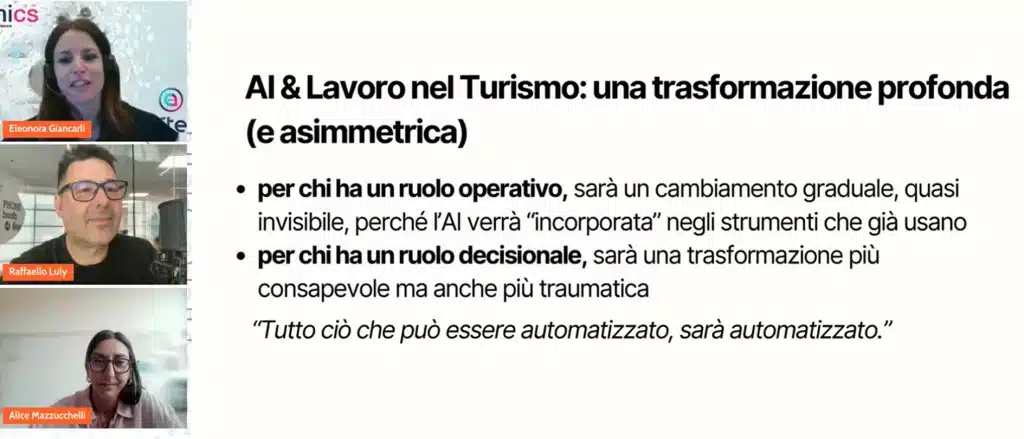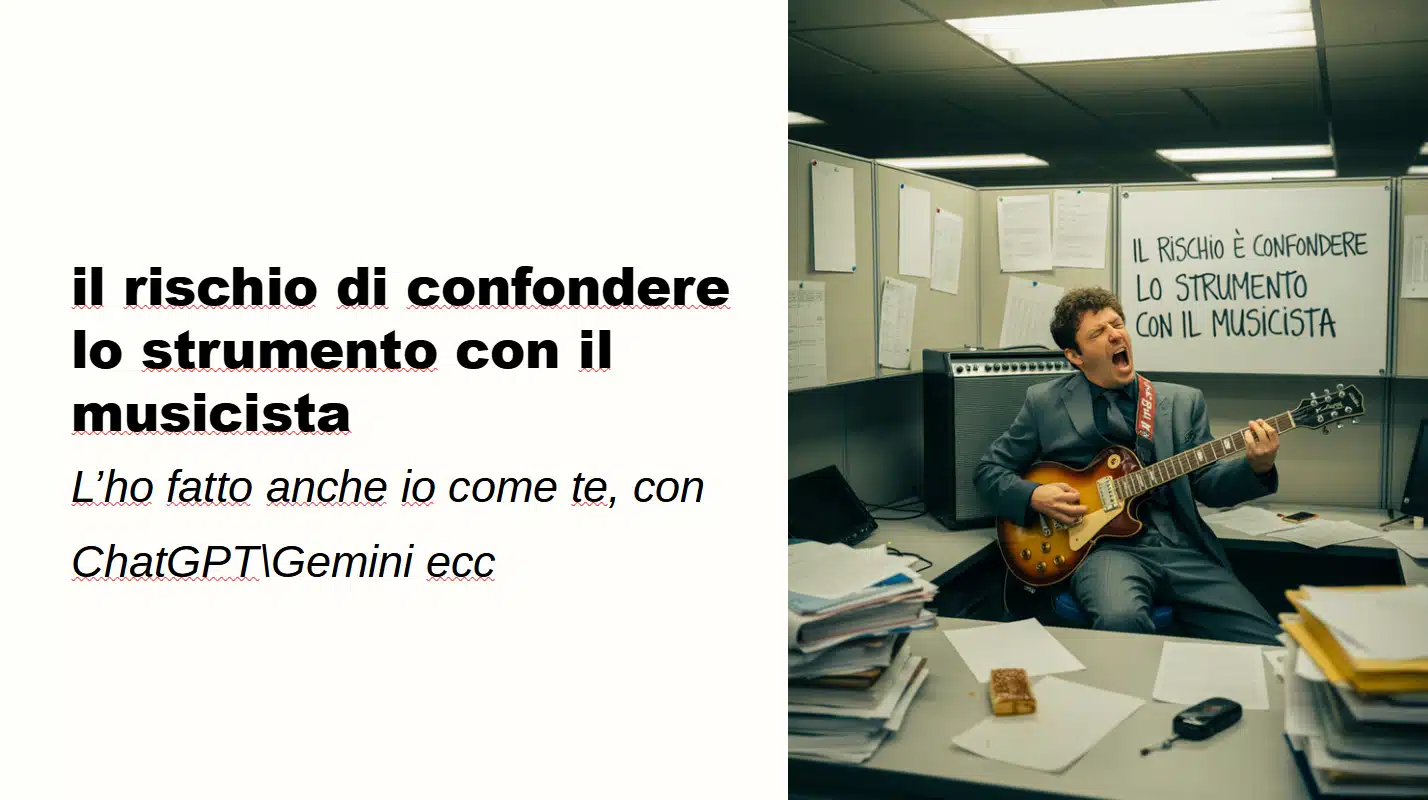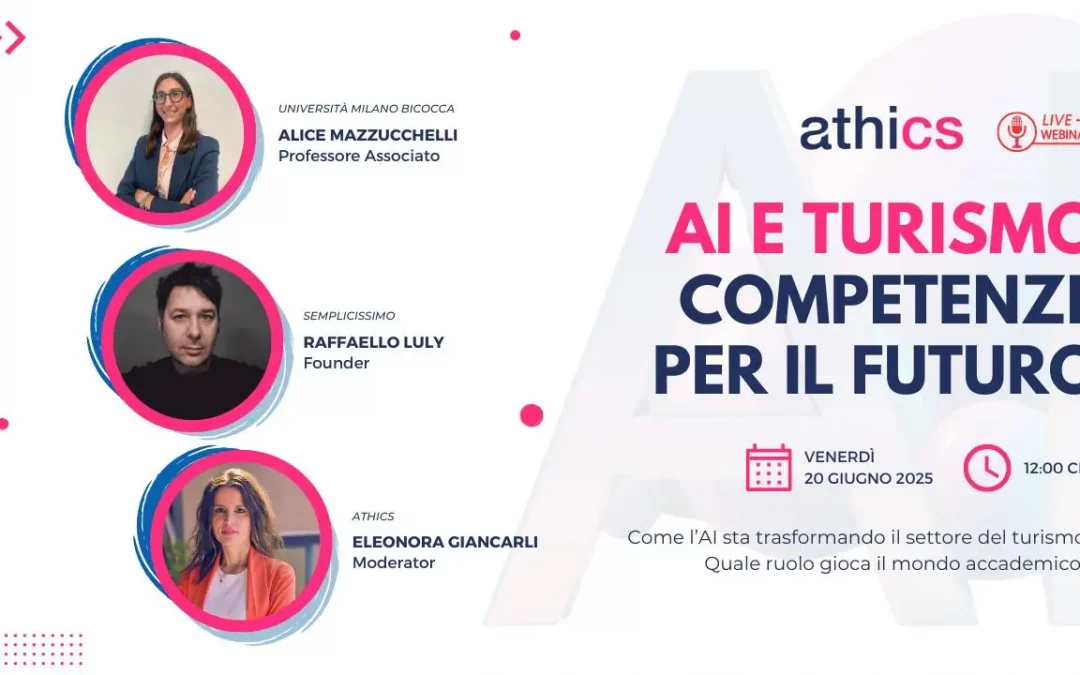AI in tourism is rapidly revolutionizing the way we travel, plan and interact with destinations. It is no longer a distant technology, but a concrete tool used by travel agencies, tour operators, online platforms and small businesses to save time, improve efficiency and offer increasingly personalized experiences.
During the recent Athics webinar “AI and Tourism: Skills for the Future between Innovation and Training” we explored this revolution from the point of view of new technologies to adopt and new skills to acquire, in the company of
- Alice Mazzucchelli, Associated Professor, University Milano Bicocca & Senior Research Consultant CRIET
- Raffaello Luly, Founder di Semplicissimo, Travel tech Expert & Professor of Tourism Strategy and Management Master of University Milano Bicocca
Estimated reading time: 7 minutes
Table of Contents
- AI in Tourism Scenario
- What are the most popular AI tools?
- From knowing how to do to knowing how to think: what awareness in terms of skills and roles?
- How can AI enhance human skills?
- What are the emerging professional profiles?
- In Conclusion: What is the most important human skill to cultivate?
- How to implement aI in tourism
AI in Tourism Scenario
The adoption of generative and conversational AI solutions is already a reality in the travel sector. According to the Amadeus report, 46% of tourism technology leaders consider AI in tourism a top priority, while the main barriers include a lack of skills. For this very reason, academic work to train new professional figures and acquire “soft skills” is essential.

What are the most popular AI tools?
While there are still those who limit themselves to using generative AI to ask “Google-style” questions, companies are starting to use the tool as a business assistant, tailored to their own data and processes. The growing trend is to integrate AI in tourism as a business assistant, that is, a personalized tool that works on internal data and processes, rather than on generic information.
This evolution translates into increasingly contextualized and vertical tools, including:
- Intelligent chatbots trained on company data: virtual assistants capable of responding in natural language to complex questions about catalogs, travel packages, travel conditions, regulations or specific promotions.
- Automatic quote and itinerary generation systems: powered by generative AI, these tools help agencies create customized proposals in a few seconds, improving operational efficiency.
- Personalized recommendation engines: they suggest destinations, experiences or upgrades based on user behavior and preferences, increasing the conversion rate.
- Predictive demand analysis: using machine learning, it is possible to predict booking peaks, tourist flows and traveller behaviour, to optimise supply and resource management.
- AI for omnichannel customer service: integrated tools that automatically respond to emails, WhatsApp messages, reviews or social comments, with a coherent language in line with the company tone of voice.
These tools, if well implemented, do not replace the human value but amplify it, allowing tourism operators to focus on more strategic and relational activities. AI in tourism, in this sense, is not just a tool, but a true digital colleague.
From knowing how to do to knowing how to think: what awareness in terms of skills and roles?
The introduction of AI in tourism does not simply imply the adoption of new technological tools, but requires a deeper change: an evolution of skills and a redefinition of professional roles.
In the words of Raffaello Luly:
“The risk is to confuse the instrument with the musician. Owning a guitar does not mean having the skills of Jimi Hendrix. Similarly, accessing ChatGPT is not enough to create a valuable offer. You need to have knowledge and skills to ask the right questions to generative AI”.

This reflection highlights a crucial aspect: AI in tourism is only powerful if guided by critical thinking, knowledge of the context and the ability to interpret. It is not enough to “know how to do” in a technical sense, it is necessary to “know how to think” in a strategic, creative and multidisciplinary way.
In concrete terms, this means that tourism professionals must acquire new digital skills, but also develop transversal skills such as:
- formulating effective and relevant prompts;
- critically evaluating the contents generated by AI;
- integrating AI responses into business processes in a coherent and distinctive way;
- maintaining human control over the tone, the message and the overall experience offered to the customer.
It is therefore not just a matter of learning to use a platform, but of rethinking one’s role within the organization: from executive operator to curator of the experience, from information manager to orchestrator of intelligent processes.
In this new scenario, artificial intelligence does not replace human thought, but amplifies it – provided that those who use it know how to guide it with awareness and vision.
According to Alice Mazzucchelli:
The response of the academic field is precisely to adapt the degree courses to intercept the real needs of companies, developing digital skills, but above all transversal soft skills, which are essential today to enter the world of work.
In Universities, the curricula of degree courses are being updated by inserting modules in machine learning, prompt engineering, design thinking, creative thinking, business data science with the aim of combining managerial skills with business analytical skills.
This is to be able to interpret artificial intelligence and not just use it”.
How can AI enhance human skills?
In the words of Alice Mazzucchelli:
“Technology must not be opposed to human skills, but must be a complementary tool”. We must enhance what AI cannot replicate, such as empathy, critical thinking, the ability to interpret, intercultural communication. All elements that bring value not only to the world of tourism, but in all sectors”.
In short, it is not enough to use the tools to do the homework, but we need to understand the logic and the impact that these technologies can have from a social and economic point of view.
What are the emerging professional profiles?
According to research by Dell Technology, 85% of the jobs that will exist in 2030 do not yet exist today.
The most sought-after profiles that integrate digital and humanistic skills are data scientists, experts in sustainability, digital marketing with a focus on AI and personalization, experts in user experience.
In tourism specifically, profiles of experts in experiential tourism, destination managers who know how to analyze data, experts in sustainable and regenerative tourism emerge.
To bring AI in tourism,a transversal and connecting role of “AI Manager” could join these specialized professional figures, capable of carring innovation into all processes.
In Conclusion: What is the most important human skill to cultivate?
In the age of AI in tourism, the most important human skill is not knowing how to program or use a technological platform, but knowing how to interpret. As clearly emerged in the webinar, the key skills to develop are critical thinking, the ability to read the context, empathy and relational skills.
Artificial intelligence is able to generate answers, but it does not know the “why” and the “for whom”. It is human intelligence that gives meaning, places each content in the right scenario, understands whether an answer is suitable for a given customer, tone, situation or corporate value. As has been underlined, AI needs to be guided first, and validated afterwards.
This implies that, even in the most automated processes, a figure is needed that is capable of asking the right questions, evaluating the relevance of the answers and, above all, understanding the impact of technological choices on people. Without this conscious supervision, the risk is that of blindly relying on a powerful but impersonal tool.
In short, the real skill of the future is not technical, but human: giving meaning to artificial intelligence through our emotional, social and critical intelligence. Because technology is a means, but we create the meaning.
How to implement aI in tourism
For companies in the tourism sector, the implementation of AI-based automation must start from a clear analysis of the company objectives.
- Define the goal
Speed up customer responses? Improve data analysis? Optimize quote management?
- Map existing processes
Understand where there are inefficiencies, bottlenecks or repetitive tasks.
- Explore available technologies
Molte soluzioni sono già “no code”, non richiedono sviluppatori interni e possono essere integrate rapidamente.
- Evaluate initial support
A discussion with an expert can help you understand what the market offers today and how to adapt it to your reality..
- Choose secure and scalable tools
Prefer platforms that guarantee data security, privacy compliance (GDPR compliance) and the possibility of growth over time.
Faqs about AI in Tourism
From clarifying your goals (e.g. improving customer response), exploring the available tools and evaluating with an expert what can bring value to your reality.
ChatGPT and similar are the most popular, but dynamic pricing tools, predictive analytics, and personalized virtual assistants are also gaining popularity.
In addition to basic digital skills, analytical skills, data interpretation and soft skills such as empathy and critical thinking are needed.

